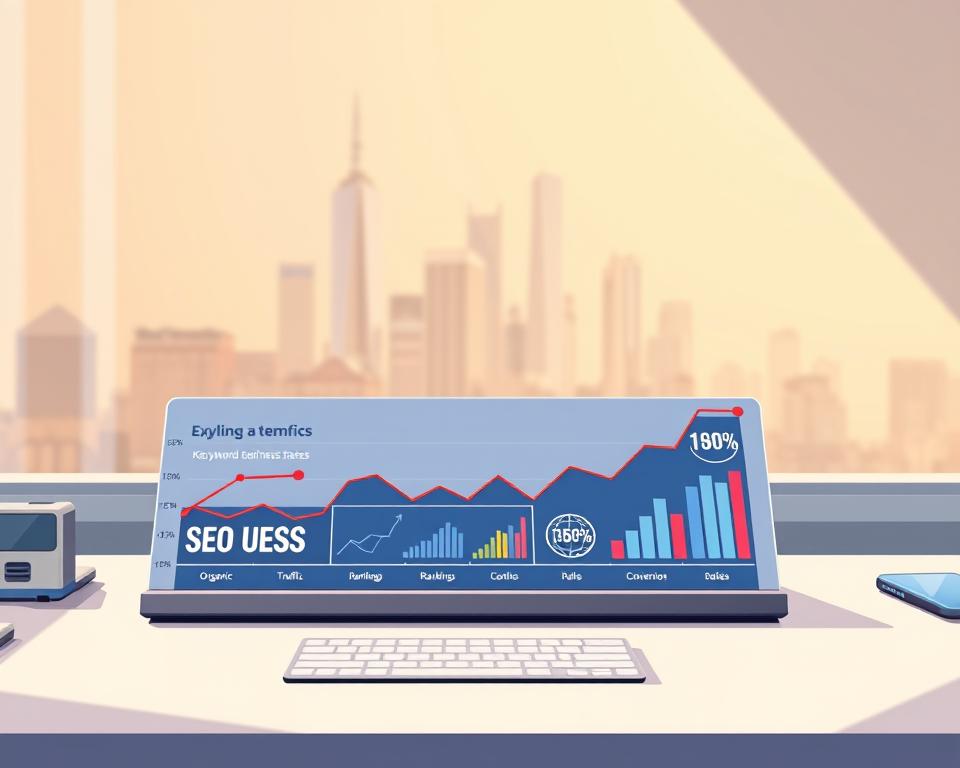1on1 Marketing: Access Personal Customer Connections.
Have you ever wondered why certain brands resonate with their audience while others fall flat? The secret lies in 1on1 Marketing, a game-changing method that turns generic marketing into personalized experiences. It focuses on individual tastes, creating a bond that traditional marketing can’t match. It redirects the focus from one-size-fits-all messaging to targeted tactics that talk directly to each customer’s core.
By adopting 1on1 Marketing, businesses can build more meaningful connections. They create strategies that genuinely strike a chord with their audience. This section explores the core of 1on1 Marketing, showing how it enables brands to engage with customers on a more personal level, company website.
How Marketing Strategies Have Transformed
Over time, the marketing landscape has undergone a dramatic shift. Initially, marketers used one-size-fits-all strategies, relying on broad messaging for average consumer behavior. Today, the market demands a focus on customer engagement through tailored dialogues. This shift emphasizes the need to understand each customer as an individual, not just part of a group.
With marketing’s evolution, it’s clear that generic tactics fall short. Today’s methods focus on building real relationships rather than simply selling products. Marketers now use data insights to inform their approach, moving towards personalized tactics that meet unique customer needs.
This evolution not only deepens customer connections but also boosts brand loyalty and retention. In a world where consumers face endless choices, brands that offer personalized experiences stand out. They create spaces for dialogue and engagement, making customers feel valued and understood.

| Strategy Type | Characteristics | Example |
|---|---|---|
| Generic Approach | Mass targeting, wide reach | Generic ad campaigns |
| Personalized Engagement | Customized dialogues, fine-tuned reach | Segmented email flows |
Why Personalization Matters in B2B Marketing
The B2B marketing landscape is rapidly changing, making personalization essential. Marketers aim to boost conversion rates through personalized 1:1 marketing. Research indicates that many view this as critical for retention. In today’s fast-paced world, connecting with audiences through effective engagement is critical.
Personalized marketing tackles the challenge of grabbing attention. It makes sure messaging resonates with each individual’s tastes. Focusing on personal experiences allows brands to shine amid competition.
The rise in customer touchpoints has heightened the need for personalized engagement. Brands that adopt personalized strategies meet customer needs and build lasting connections. This approach can give a significant edge in the competitive market today.
Defining One-to-One Marketing
One-to-one marketing is about tailoring experiences to meet each customer’s unique needs. It leverages data insights to design bespoke engagement tactics. This approach creates strong customer connections by focusing on individualized experiences.
For example, a coffee shop where the barista remembers a customer’s favorite order illustrates one-to-one marketing. This simple gesture shows how attending to preferences bolsters satisfaction. It transforms a routine purchase into a memorable experience, enhancing loyalty.
Implementing one-to-one Marketing requires a deep dive into customer data. They analyze behaviors and preferences to craft messaging. This guarantees marketing efforts hit the mark with distinct tastes, producing stronger connections and greater satisfaction.
As businesses seek personalized engagement, they realize customization is essential for lasting success. Those mastering bespoke experiences reap substantial rewards.
Benefits of Personalized Customer Engagement
Personalized customer engagement brings numerous benefits to modern brands. It significantly boosts customer satisfaction by providing tailored experiences that meet individual preferences and needs. Studies show that 80% of consumers prefer to buy from brands that offer personalized interactions. This underscores the power of tailored marketing.
Personalized loyalty programs boost retention. By addressing specific pain points and preferences, businesses create an environment where customers feel valued and understood. This link promotes repeat business, increasing profits.
Personalized marketing also leads to higher conversion rates. Tailored recommendations and targeted content guide customers through the sales funnel, improving their journey from consideration to purchase. Emphasizing these benefits enhances brand image and primes businesses for competitive success.
| Benefit | Description | Impact |
|---|---|---|
| Happy Customers | Personalized experiences improve overall customer happiness. | Increased chances of repeat purchases. |
| Loyalty Programs | Custom offers boost customer engagement. | Stronger retention and brand loyalty. |
| Sales Upsurge | Targeted content spurs customer actions effectively. | Growth in sales and revenue. |
Personalization Challenges
Implementing tailored marketing presents several challenges. One major challenge is the complexity of data collection. Robust data is essential for effective segmentation. Without it, marketers struggle to craft messages that truly resonate, leading to missed opportunities and inefficient campaigns.
Brands targeting specific audiences must navigate the fine line between personalized and generic communication. Big enterprises struggle to keep a personal touch amid heavy automation. This can result in losing the personal touch that customers cherish. – 1 on 1 Marketing1on1 official company website
Small businesses encounter unique barriers too. They often struggle to define their messaging, hindering their ability to leverage personalized marketing’s benefits. Recognizing these challenges is essential for marketers aiming to improve their strategies and engage customers more effectively.
Tech That Powers One-to-One Marketing
Groundbreaking technologies in marketing are reshaping the realm of personalized customer engagement. Customer Relationship Management (CRM) systems stand out as a key component. They handle data, essential for crafting bespoke experiences. A strong CRM enables deeper insight into preferences and behaviors.
AI enhances personalization with precise targeting and automation. Machine learning algorithms sift through vast datasets to uncover trends and consumer behaviors. This enables marketers to refine their strategies. Such automation cuts down on manual work and boosts the effectiveness of marketing campaigns.
Studies reveal that 72% of marketers focus on CRM systems for personalization. Marketing automation tools are used by 55% to streamline campaigns. These technologies empower businesses to offer customized experiences on a large scale. They ensure campaigns resonate with individuals rather than broad audiences.
Merging these tools creates a dynamic engagement framework. The fast-evolving scene drives adoption of cutting-edge tech. These tools not only improve efficiency but also strengthen connections with their audiences.
Best Practices for Personalizing Marketing Efforts
Successful personalization rests on core best practices. They guarantee resonance and improved engagement. Key components include:
- Audience segmentation is essential for targeting specific groups based on common traits. This method allows for more precise messaging, boosting engagement rates significantly.
- Using optimized messaging improves the customer experience. Uniform, relevant messaging across platforms builds trust and fosters ongoing engagement.
- Adopting testing strategies, like A/B testing, is critical. It identifies the most effective tactics by comparing messages and metrics.
Utilizing customer data is vital for understanding their behaviors and preferences. Regular analysis refines strategies. By adhering to these best practices, brands can craft a personalized approach that resonates with their target audience.
Creative Ways to Personalize
Innovative tactics improve personalization across all touchpoints. Brands now use personalized emails that match individual tastes, making messages more impactful. Analyzing purchase history allows spot-on product suggestions, driving sales.
Segment-specific videos are another smart tactic. It grabs attention and builds a strong emotional bond between the brand and its audience. Adaptive loyalty programs that align with behaviors reward meaningful interactions, enhancing the journey.
| Creative Tactic | Description | Benefit |
|---|---|---|
| Personalized Emails | Emails designed to individual preferences and behaviors. | Boosts engagement and conversion rates. |
| Suggested Products | Suggestions based on previous purchases and browsing history. | Enhances sales and customer satisfaction. |
| Segmented Videos | Video content designed for specific segments. | Deepens brand connection and engagement. |
| Adaptive Rewards | Rewards systems that adapt to individual behaviors. | Drives loyalty and repeat business. |
Companies gain significantly by weaving customized offers into social media, email, and app alerts. Each interaction is a chance to show the brand’s dedication to personalized marketing. This creates unforgettable experiences that help the brand stand out in a busy market.
What’s Next for One-to-One Marketing
One-to-one Marketing is evolving fast, propelled by cutting-edge trends. Marketers will use AI to create personalized campaigns that meet individual needs. It improves campaign outcomes and strengthens connections by delivering timely, relevant content.
Another key trend is the importance of omnichannel experiences. Consumers demand seamless transitions across social, email, and other channels. Brands must ensure consistent messaging to meet these expectations. Understanding where and how customers interact helps create a unified experience, strengthening brand loyalty.
Adapting to these shifts, ethical data practices will become essential for maintaining trust with consumers. Amid rising privacy concerns, transparency and responsibility in data handling are non-negotiable. Prioritizing ethical practices meets regulations and builds trust, paving the way for loyal relationships in one-to-one Marketing’s future.


